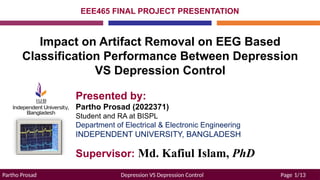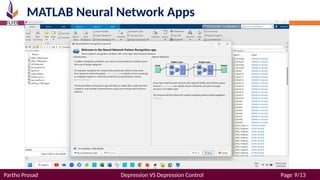Impact on Artifact Removal on EEG Based Classification Performance Between Depression VS Depression Control.pptx
- 1. Partho Prosad Depression VS Depression Control Page 1/13 Presented by: Partho Prosad (2022371) Student and RA at BISPL Department of Electrical & Electronic Engineering INDEPENDENT UNIVERSITY, BANGLADESH EEE465 FINAL PROJECT PRESENTATION Impact on Artifact Removal on EEG Based Classification Performance Between Depression VS Depression Control Supervisor: Md. Kafiul Islam, PhD
- 2. Partho Prosad Depression VS Depression Control Page 2/13 Outline Data Description EMOTIV Epoc+ Electrode name MATLAB Neural Network Apps Results
- 3. Partho Prosad Depression VS Depression Control Page 3/13 Data Description In the depression study, there are 13 control subjects and 18 subjects with depression. The anxiety study, 15 were control subjects and 23 subjects were suffering from anxiety. I focus on ‘depression vs depression control’ in this project.
- 4. Partho Prosad Depression VS Depression Control Page 4/13 Data Description (Cont.) Total 69 EEG Dataset DCSub.mat 13 DSub.mat 18 ACSub.mat 15 ASub.mat 23 Non Uniform Class
- 5. Partho Prosad Depression VS Depression Control Page 5/13 EMOTIV Epoc+
- 6. Partho Prosad Depression VS Depression Control Page 6/13 EMOTIV Epoc+
- 7. Partho Prosad Depression VS Depression Control Page 7/13 Electrode Name Channel Number Electrode Name 01 AF3 02 F7 03 F3 04 FC5 05 T7 06 P7 07 O1 Channel Number Electrode Name 08 O2 09 P8 10 T8 11 FC6 12 F4 13 F8 14 AF4
- 8. Partho Prosad Depression VS Depression Control Page 8/13 Hjorth parameters Hjorth Parameters
- 9. Partho Prosad Depression VS Depression Control Page 9/13 MATLAB Neural Network Apps
- 10. Partho Prosad Depression VS Depression Control Page 10/13 Various kind of wavelet Fig. Various kind of wavelet Wavelet Decomposition (Process)
- 11. Partho Prosad Depression VS Depression Control Page 11/13 Wavelet selection and Plotting Coefficient Fig. Wavelet selection Wavelet Families
- 12. Partho Prosad Depression VS Depression Control Page 12/13 Results From MATLAB (Show in the Live Presentation) [August 30, 2023]
- 13. Partho Prosad Depression VS Depression Control Page 13/13 Any questions, comments or suggestions?












![Partho Prosad Depression VS Depression Control Page 12/13
Results
From MATLAB
(Show in the Live Presentation)
[August 30, 2023]](https://image.slidesharecdn.com/impactonartifactremovaloneegbasedclassificationperformancebetweendepressionvsdepressioncontrol-250312202011-7c23f668/85/Impact-on-Artifact-Removal-on-EEG-Based-Classification-Performance-Between-Depression-VS-Depression-Control-pptx-12-320.jpg)
